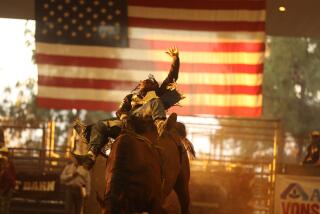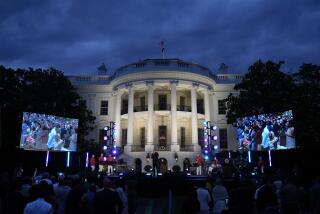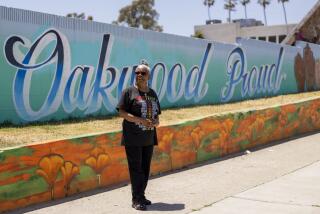It’s the Perfect Day to Celebrate Freedom
- Share via
Some brought their children and grandchildren so they too would remember Juneteenth, the day the Emancipation Proclamation came to slaves in Galveston, Texas.
Mattie Ward said the annual picnic at Leimert Park on Wednesday was subdued compared to events in her hometown of Shreveport, La.
“We used to call it a boogie-woogie,” said the 70-year-old grandmother, smiling broadly at her 4-year-old grandson, Alexander Pratt.
This was Ward’s first Juneteenth celebration in Los Angeles--just one of a handful held throughout Southern California this week--and she was joined by about 2,000 other people who streamed into the park.
In Shreveport, Ward said, most African Americans stayed home from work and school on June 19. They celebrated with picnics and dances.
“I wanted the kids to see this,” said Ward of her grandson and his friend Sierra Callaway, also 4, who squirmed in a folding chair, her blond hair bright in the sun.
“It’s important to remember because our parents remembered,” Ward said.
On June 19, 1865--2 1/2 years after the signing of the Emancipation Proclamation--the Union Army arrived in Galveston and informed the slaves there that they were free.
The newly freed celebrated over “red soda water” and watermelon, about all they had, the organizers said. And since then, June 19 has been commemorated among African Americans, mostly in the southwest, as Emancipation Day.
In June 1999, the California Legislature passed Assembly Concurrent Resolution No. 64, recognizing June 19 as Juneteenth or Emancipation Day.
A ceremony at the Watts Towers and Arts Center on Wednesday afternoon to honor African American sculptor and architect John Outterbridge was punctuated with a reception at which watermelon and strawberry soda were served.
Jonathan Leonard of View Park, a Texas native in cowboy boots and red, white and blue shirt, presided over the Leimert Park get-together. The 71-year-old grandfather--who has an 8-year-old daughter--began hosting Juneteenth picnics in his backyard in 1949. Today, it costs about $5,000 to put on the event, he said.
“This is like a homecoming for a whole lot of people,” Leonard said. “There are a lot of Texans here who recognize Juneteenth like you would the Fourth of July.”
“It’s important for us to celebrate and get together,” said Virena Woods of Inglewood, sitting in the shade with her family.
Wearing a yellow head wrap and matching dress, the 67-year-old grandmother said the gathering is much more important than July 4, because for African Americans, it marks the end of hundreds of years of bondage.
It’s also heartwarming, said the native Texan, to see people of color gathering on a warm, late spring day to remember their heritage, and to teach the next generation.
“It’s beautiful to see all these brown faces together,” she said, shouting over the blues that wafted from a boombox propped up in a nearby store windowsill. “Every year I come out. I make it my business to come out.”
More to Read
Sign up for Essential California
The most important California stories and recommendations in your inbox every morning.
You may occasionally receive promotional content from the Los Angeles Times.













